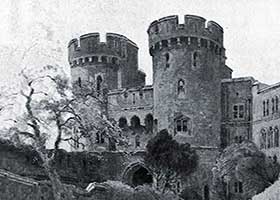Medieval Tournaments - Medieval Tournaments - Types of Combat
- Medieval Tournaments - Ladies & Courtly Love
- Medieval Tournaments - Spoils of Combat
- Medieval Tournaments - The Lists
- Medieval Tournaments - The Kippers!
Medieval TournamentsMedieval Tournaments - The Different Types of Combat
There were different types of Medieval Tournaments, joust or melees, which each had a different type of combat method. - Joust a plaisance Tournament - A series of elimination jousts over several days and an overall winner would be determined. Each Knight would run the lists three times with each opponent
- Pas d'armes or passage of arms Tournament - A Knight would send out a proclamation that he would take on all challengers at a specific time and place.
- Melee a pied Tournament - Teams of knights fighting on foot
- Melee a cheval Tournament - Teams of knights fighting on horseback
Regulating the Medieval Tournaments - The Statute of Arms
The number of injuries and fatalities that occurred during early Medieval tournaments had to be regulated. Early tournaments were wild affairs - copious alcohol was consumed and many tournaments ended with the pillage, rape, and slaughter of local villagers! Valuable Knights were killed and injured at tournaments. In 1292 the "Statute of Arms for Tournaments" was ordained "at the request of the earls and barons and of the knighthood of England" which provided new laws for tournaments. The Statute of Arms ordained that no pointed weapons should be used - they should be blunted. And that tournaments had to be properly organised and only authorised combatants were allowed to carry arms. Medieval Tournaments - The Location
The Medieval Tournaments lasted over several days. As the tournaments became more organised, so did the event itself. The location of the tournament would be allocated by the sponsor. The sponsor was often a rich noble who would finance the prize. The tournament would therefore be located on a field near to the nobles castle and local village. The Lists were the designated area for jousting fenced off in the centre of the field. Wooden bench seats were sometimes erected but usually villagers sat on the ground in view of the lists. The Nobles sat in the galleries - pavilions erected to provide shelter. The whole area would be blazoned with color. The tents and blazons of the Knights. Even the horses were draped in flowing cloth, called a caparison, which was patterned according to its owner's heraldic signs. Medieval Tournaments - The Kippers and the Spoils!
Medieval tournaments were a good source of revenue for a successful Knight. If they were lucky they would claim the champion's prize money. But at early tournaments they were also allowed, as was the right of a knight, to seize the armour and weapons of a fallen adversary during the tournament. (Later the tournaments were governed by pomp, ceremony and chivalric conduct and this right was waived.) To claim the armour and weapons the knight employed a vassal, serf or peasant, as his 'Kipper'. A Kipper was expected to collect the 'Spoils of Combat'. The word 'Kipper' originated from the Scandinavian word 'Kippa' which means to snatch or to seize. The weapons and armour was expensive and a fallen knight would not give them up easily. The Kipper was therefore armed with blunt but heavy clubs with which they could knock the unfortunate Knight into an unconscious state! Medieval Tournaments - The Ladies Favours, Courtly Love and the Chivalric Code! Ladies attended Medieval tournaments. Watching the exploits of the men during the day and attending the feasts and banquets in the evening. The rise of the ideals of courtly love was dominated by the concept that that honor should be done to a lady by her champion. The Rules of Courtly Love allowed a Knight to express his admiration even for married ladies. Knights begged "tokens" from ladies. And were presented with "favours" such as a veil, ribbon, or the detachable sleeve of a ladies dress. These 'favours' would be displayed by the Knight attached to his arm, his helm or tied to his lance. The lady thereby showed her favour to the knight who would dedicate his performance at the tournament to the lady. Medieval Tournaments
Medieval Tournaments were exiting colorful pageants. Hundreds of Knights participated in this Medieval sport. Jousts, Melees, pageantry, Courtly Love and the Chivalric code all played a part in Medieval tournaments. | 
